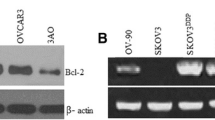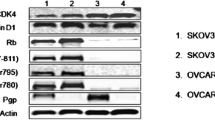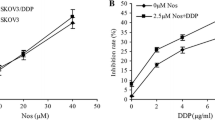Abstract
Goals
Resistance to cisplatin is the main reason for treatment failure in ovarian cancer. Apoptosis is the main mechanism of action of most cancer chemotherapeutic agents. The apoptosis-associated proteins expressed in cisplatin-sensitive (A2780, COC1) and -resistant (A2780/DDP, COC1/DDP) ovarian cancer cell lines, as well as their effects on caspase-3 activity in these cells, were studied by reverse transcriptase polymerase chain reaction and Western blot analysis.
Methods
The apoptotic ratios of A2780, COC1, A2780/DDP, and COC1/DDP cells after treatment with cisplatin were measured by flow cytometry.
Results
Expression of Bcl-2 and Bcl-XL in A2780/DDP and COC1/DDP cells was significantly higher than that in A2780 and COC1 cells, respectively. Expression of Bax and Bcl-Xs did not differ in cisplatin-resistant and -sensitive cells. Caspase-3 activity was reduced markedly and apoptotic ratios were significantly lower in A2780/DDP and COC1/DDP cells than in A2780 and COC1 cells after treatment with cisplatin.
Conclusion
We conclude that overexpression of antiapoptotic proteins Bcl-2 and Bcl-XL and down-regulation of caspase-3 activity may be associated with cisplatin resistance in human ovarian cancer.





Similar content being viewed by others
References
Blanc C, Deveraux QL, Krajewski S, et al (2000) Caspase-3 is essential for procaspase-9 processing and cisplatin-induced apoptosis of MCF-7 breast cancer cells. Cancer Res 60:4386–4390
Choi YH, Kim MJ, Lee SY, et al (2002) Phosphorylation of p53, induction of Bax and activation of caspases during beta-lapachone-mediated apoptosis in human prostate epithelial cells. Int J Oncol 21:1293–1299
Ding Z, Yang X, Pater A, Tang SC (2000) Resistance to apoptosis is correlated with the reduced caspase-3 activation and enhanced expression of antiapoptotic proteins in human cervical multidrug-resistant cells. Biochem Biophys Res Commun 270:415–420
Donepudi M, Grutter MG (2002) Structure and zymogen activation of caspases. Biophys Chem 101–102:145–53
Ferreira CG, Span SW, Peters GJ, Kruyt FA, Giaccone G (2000) Chemotherapy triggers apoptosis in a caspase-8-dependent and mitochondria-controlled manner in the non-small cell lung cancer cell line NCI-H460. Cancer Res 60:7133–7141
Frankel A, Rosen K, Filmus Ag, Kerbel RS (2001) Induction of anoikis and suppression of human ovarian tumor growth in vivo by down-regulation of Bcl-X (L). Cancer Res 61:4837-4841
Granville DJ, Jiang H, An MT, Levy JG, McManus BM, Hunt DW (1999) Bcl-2 overexpression blocks caspase activation and downstream apoptotic events instigated by photodynamic therapy. Br J Cancer 79:95–100
Grobholz R, Zentgraf H, Kohrmann KU, Bleyl U (2002) Bax, Bcl-2, fas and Fas-L antigen expression in human seminoma: correlation with the apoptotic index. APMIS 110:724–732
Henkels KM, Turchi JJ (1999) Cisplatin-induced apoptosis proceeds by caspase-3-dependent and -independent pathways in cisplatin-resistant and -sensitive human ovarian cancer cell lines. Cancer Res 59:3077–3083
Kobayashi T, Sawa H, Morikawa J, Zhang W, Shiku H (2000) Bax induction activates apoptotic cascade via mitochondrial cytochrome c release and Bax overexpression enhances apoptosis induced by chemotherapeutic agents in DLD-1 colon cancer cells. Jpn J Cancer Res 91:1264–1268
Liang Y, Yan C, Schor NF (2001) Apoptosis in the absence of caspase3.Oncogene 20:6570–6578
NicAmhlaoibh R, Heenan M, Cleary I, et al (1999) Altered expression of mRNAs for apoptosis-modulating proteins in a low level multidrug resistant variant of a human lung carcinoma cell line that also expresses mdr1 mRNA. Int J Cancer 82: 368–376
Ohi Y, Kim R, Toge T (2000) Overcoming of multidrug resistance by introducing the apoptosis gene, bcl-Xs, into MRP-overexpressing drug resistant cells. Int J Oncol 16:959–969
Porter Ag, Janicke RU (1999) Emerging roles of caspase-3 in apoptosis. Cell Death Differ 6:99–104
Saporito MS, Hudkins RL, Maroney AC (2002) Discovery of CEP-1347/KT-7515, an inhibitor of the JNK/SAPK pathway for the treatment of neurodegenerative diseases. Prog Med Chem 40:23–62
Sasaki H, Kotsuji F, Tsang BK (2002) Caspase 3-mediated focal adhesion kinase processing in human ovarian cancer cells: possible regulation by X-linked inhibitor of apoptosis protein. Gynecol Oncol 85:339–350
Sleiman RJ, Stewart BW (2000) Early caspase activation in leukemic cells subject to etoposide-induced G2-M arrest: evidence of commitment to apoptosis rather than mitotic cell death. Clin Cancer Res 6:3756–3765
Soldatenkov VA, Smulson Ag (2000) Poly(ADP-ribose) polymerase in DNA damage-response pathway: implications for radiation oncology. Int J Cancer 90:59–67
Taylor JK, Zhang QQ, Monia BP, Marcusson EG, Dean NM (1999) Inhibition of Bcl-xL expression sensitizes normal human keratinocytes and epithelial cells to apoptotic stimuli. Oncogene 18:4495–4504
Tsujimoto Y, Croce CM (1986) Analysis of the structure, transcripts, and protein products of bcl-2, the gene involved in human follicular lymphoma. Proc Natl Acad Sci USA 83:5214–5218
Yang XH, Sladek TL, Liu X, Butler BR, Froelich CJ, Thor AD (2001) Reconstitution of caspase 3 sensitizes MCF-7 breast cancer cells to doxorubicin- and etoposide-induced apoptosis. Cancer Res 61:348–354
Acknowledgement
The authors are grateful to Fily Gao for technical support. This work was supported by grants from the National Science Foundation of China (No. 30025017) and “973” Program of China (No. 2002CB513107).
Author information
Authors and Affiliations
Corresponding author
Additional information
This paper reports on an experimental study.
Rights and permissions
About this article
Cite this article
Yang, X., Zheng, F., Xing, H. et al. Resistance to chemotherapy-induced apoptosis via decreased caspase-3 activity and overexpression of antiapoptotic proteins in ovarian cancer. J Cancer Res Clin Oncol 130, 423–428 (2004). https://doi.org/10.1007/s00432-004-0556-9
Received:
Accepted:
Published:
Issue Date:
DOI: https://doi.org/10.1007/s00432-004-0556-9




